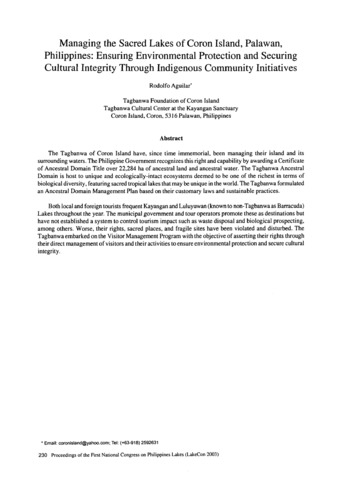Managing the sacred lakes of Coron Island, Palawan, Philippines: Ensuring environmental protection and securing cultural integrity through indigenous community initiatives
| dc.contributor.author | Aguilar, Rodolfo C. | |
| dc.contributor.editor | Cuvin-Aralar, Maria Lourdes | |
| dc.contributor.editor | Punongbayan, Raymundo S. | |
| dc.contributor.editor | Santos-Borja, Adelina | |
| dc.contributor.editor | Castillo, Lourdes V. | |
| dc.contributor.editor | Manalili, Eduardo V. | |
| dc.contributor.editor | Mendoza, Marlynn M. | |
| dc.date.accessioned | 2021-07-27T08:00:51Z | |
| dc.date.available | 2021-07-27T08:00:51Z | |
| dc.date.issued | 2005 | |
| dc.identifier.citation | Aguilar, R. C. (2005). Managing the sacred lakes of Coron Island, Palawan, Philippines: Ensuring environmental protection and securing cultural integrity through indigenous community initiatives. In M. L. Cuvin-Aralar, R. S. Punongbayan, A. Santos-Borja, L. V. Castillo, E. V. Manalili, & M. M. Mendoza (Eds.), Proceedings of the First National Congress on Philippine Lakes (p. 230). Southeast Asian Regional Center for Graduate Study and Research in Agriculture (SEARCA). | en |
| dc.identifier.issn | 1656-8099 | |
| dc.identifier.uri | http://hdl.handle.net/10862/6140 | |
| dc.description | Abstract only. | en |
| dc.description.abstract | The Tagbanwa of Coron Island have, since time immemorial, been managing their island and its surrounding waters. The Philippine Government recognizes this right and capability by awarding a Certificate of Ancestral Domain Title over 22,284 ha of ancestral land and ancestral water. The Tagbanwa Ancestral Domain is host to unique and ecologically-intact ecosystems deemed to be one of the richest in terms of biological diversity, featuring sacred tropical lakes that may be unique in the world. The Tagbanwa formulated an Ancestral Domain Management Plan based on their customary laws and sustainable practices. Both local and foreign tourists frequent Kayangan and Luluyuwan (known to non-Tagbanwa as Barracuda) Lakes throughout the year. The municipal government and tour operators promote these as destinations but have not established a system to control tourism impact such as waste disposal and biological prospecting, among others. Worse, their rights, sacred places, and fragile sites have been violated and disturbed. The Tagbanwa embarked on the Visitor Management Program with the objective of asserting their rights through their direct management of visitors and their activities to ensure environmental protection and secure cultural integrity. | en |
| dc.language.iso | en | en |
| dc.publisher | Southeast Asian Regional Center for Graduate Study and Research in Agriculture (SEARCA) | en |
| dc.subject | ancestry | en |
| dc.subject | customary law | en |
| dc.subject | Philippines | en |
| dc.title | Managing the sacred lakes of Coron Island, Palawan, Philippines: Ensuring environmental protection and securing cultural integrity through indigenous community initiatives | en |
| dc.type | Conference paper | en |
| dc.citation.spage | 230 | en |
| dc.citation.conferenceTitle | Proceedings of the First National Congress on Philippine Lakes | en |
| dc.subject.asfa | environmental protection | en |
Files in this item
This item appears in the following Collection(s)
-
LakeCon2003 [49]
Proceedings of the First National Congress on Philippine Lakes


